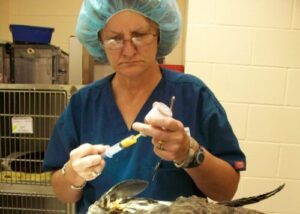Last Chance Forever
The Bird of Prey ConservancyDR. MELISSA HILL, D.V.M.
 I met John Karger while I was still in high school. He and I were volunteering at a Halloween haunted house fundraiser for an organization. Through conversation about common interests, I found out that he was a research scientist at Southwest Research Institute doing behavioral research on birds of prey. He introduced me to the interesting and intriguing world of raptors (birds of prey). He was also a master class falconer. Falconry is the art of handling properly and hunting with magnificent aerial predators. While doing research was his primary job, he was also rescuing, rehabilitating and releasing sick, injured and orphaned birds of prey back into the wild. Our friendship grew. I asked and John started to teach me falconry and how to work with the injured ones that were being brought to him for care. I had been trying to decide what field of study to do in college since animals and veterinary medicine had always been of interest. The experience and knowledge I was learning from him and the raptors made veterinary medicine a goal for me. I applied for and was accepted to Texas A&M Veterinary College. I continued volunteering with him and sought out experience with veterinarians, some with exotic animal experience he introduced me to. Over the summers and holidays during college, I tried to learn as much as I could with an intense interest in wildlife medicine. I graduated from Texas A&M Veterinary College in 1983 at a time when not much was taught about birds of prey. While working at several veterinary hospitals over the years, I continued to learn and worked as the veterinarian for Last Chance Forever on a volunteer basis. I have been doing this for 41 years now. I continue to feel strongly that the work we do, and the message that John Karger and Last Chance Forever spread about common sense conservation and the world we all share is vitally important. We have released more than 4,000 raptors over the years and placed many of the non-releasable into permanent homes in nature centers. By being able to identify diseases and environmental hazards in some of the birds brought to us, we have been able to make their and our world a little safer.
I met John Karger while I was still in high school. He and I were volunteering at a Halloween haunted house fundraiser for an organization. Through conversation about common interests, I found out that he was a research scientist at Southwest Research Institute doing behavioral research on birds of prey. He introduced me to the interesting and intriguing world of raptors (birds of prey). He was also a master class falconer. Falconry is the art of handling properly and hunting with magnificent aerial predators. While doing research was his primary job, he was also rescuing, rehabilitating and releasing sick, injured and orphaned birds of prey back into the wild. Our friendship grew. I asked and John started to teach me falconry and how to work with the injured ones that were being brought to him for care. I had been trying to decide what field of study to do in college since animals and veterinary medicine had always been of interest. The experience and knowledge I was learning from him and the raptors made veterinary medicine a goal for me. I applied for and was accepted to Texas A&M Veterinary College. I continued volunteering with him and sought out experience with veterinarians, some with exotic animal experience he introduced me to. Over the summers and holidays during college, I tried to learn as much as I could with an intense interest in wildlife medicine. I graduated from Texas A&M Veterinary College in 1983 at a time when not much was taught about birds of prey. While working at several veterinary hospitals over the years, I continued to learn and worked as the veterinarian for Last Chance Forever on a volunteer basis. I have been doing this for 41 years now. I continue to feel strongly that the work we do, and the message that John Karger and Last Chance Forever spread about common sense conservation and the world we all share is vitally important. We have released more than 4,000 raptors over the years and placed many of the non-releasable into permanent homes in nature centers. By being able to identify diseases and environmental hazards in some of the birds brought to us, we have been able to make their and our world a little safer.
Our team is dedicated. We work hard to provide the best care possible for them while educating the public about them and our world. Today, beyond caring for the many raptors that come into Last Chance Forever for care, we are called upon to provide veterinary seminars for veterinary students, falconers nationally and internationally, and advise other wildlife care givers on raptor care.
I invite you to get involved and to help support what our team of employees and volunteers have worked hard to do over the last 4 decades.
